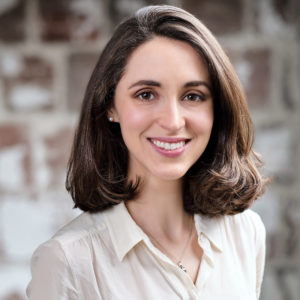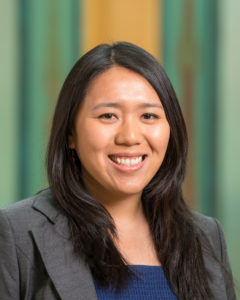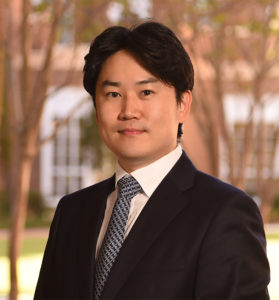
In spring 2021, the College of Business launched its first Business for a Better World Dissertation Proposal Competition, which solicited proposals from PhD candidates seeking to use business concepts to positively impact our world. Proposals came from around the globe, and ultimately, three researchers received $6,000 each to support their doctoral work.
Congratulations to Ariel de Fauconberg, University of Cambridge, Diana Jue-Rajasingh, University of Michigan, and Youngtak Kim, University of Georgia. The three winning proposals span research methods and strive to answer questions of sustainability using qualitative, in-depth interviews, international field experiments and quantitative data analysis.
“They are contributing toward making sustainability integral to research and practice.” – Ken Manning, senior associate dean for faculty and research
“Ari, Diana and Youngtak have each done a great job grounding relatively new conceptual understandings of sustainability with more established business theory and frameworks,” senior associate dean for faculty and research Ken Manning said. “Through these efforts, and their impressive empirical work, they are contributing toward making sustainability integral to research and practice.”
All three researchers joined College of Business faculty for a workshop Sep 17. They presented their progress, answered questions and received advice from faculty that believe in the power of their work.
 Ariel de Fauconberg
Ariel de Fauconberg
The Power (and Stigma) of Oil: Strategic Identity Position and Innovation in the Energy Sector
De Fauconberg is investigating how the world’s nine largest oil companies understand and respond to opposition against their carbon-neutral efforts. With several family members in the energy sector and an educational background in anthropology and environmental policy, it’s no surprise that de Fauconberg wants to know more about what motivates individuals in the industry.
“My research looks at how people within these large, active oil companies understand what they’re doing in pursuit of Net Zero strategies, and what sort of stories they tell themselves about how climate protesters, and this Net Zero movement, are casting them as ‘bad guys,’” de Fauconberg explained. “Are they picturing themselves as the good guys, which is usually what people do? Or is there some nuance to it that if you’re on the outside – or if you’re coming from a climate mitigation standpoint – you’re missing because you’re not part of the community inside of the oil companies?”
Intended business sustainability outcomes
Rather than parsing the existing data, de Fauconberg is conducting a two-year qualitative research study. Through on-site observations and interviews with individual employees about their perspectives and motivations, she is digging into their underlying affections. She hopes this work will contribute to both organizational theory and our understanding of how businesses can better facilitate sustained efforts between diverse stakeholders towards a shared vision of a socially and environmentally sustainable future.
De Fauconberg is acutely aware of tensions in both the management of oil and gas production and its geopolitical impacts. Changing the sector and its perspectives will not be easy and may not be possible.
“I do think that it’s worth mentioning that there may not actually be a common ground,” de Fauconberg said, speaking about ways forward toward carbon neutrality. “It could be that cultural perspectives from different stakeholders are so deeply entrenched that it’s something that simply can’t be shifted. And if that’s the case, then I would argue it’s still better to know this than make assumptions moving forward.”
 Diana Jue-Rajasingh
Diana Jue-Rajasingh
Developing Markets and Businesses for Environmental Health Innovations
Building on her master’s research and the company she started in South India to connect health innovations like water filters and smoke-reducing stoves to the households that needed them most, Diana Jue-Rajasingh is hoping to answer the question, “How can we do good, better?”
“You can make a really great gadget, but how do you get it out to the people who are supposed to benefit from it the most?” Jue-Rajasingh asks.
She’s approaching this problem from three perspectives, focusing on firm relationships with exchange partners, customers and funders.
The firm-to-exchange-partner relationship focuses on getting other businesses to support the creation, development and distribution of a product. Jue-Rajasingh thinks the disconnect between these groups may be addressed by social impact framing – how firms talk about social goals as a motivating factor to get others involved. So, she is examining this problem through an online experiment, which she hopes to supplement with a field experiment in India. She is piloting this study now.
“How can we do good, better?”
– Diana Jue-Rajasingh
Jue-Rajasingh also investigates firm-customer relationships, asking how firms can convince customers of the long-term value of their innovations, especially if the innovation requires regular maintenance. She will conduct field experiments to study whether text message-based reminders increase the customer’s willingness to pay for a product.
Her qualitative examination of the relationship between firms and funders may be the most complex piece of her dissertation. Jue-Rajasingh seeks to understand how markets for environmental-health innovations emerge when there is often a weak business case for the financial sustainability of the firm. She started investigating these questions in East Africa in 2019, contemplating cookstoves that reduce smoke build-up inside homes.
Intended business sustainability outcomes
“The local entrepreneurs really know the environment and know their customers,” she said. “But they’re operating in a sector that is driven by global investors and philanthropists. It seems like there are some power issues involved … there are some ways the global funders think the sector should develop that local producers don’t necessarily agree with.”
In the workshop, Jue-Rajasingh highlighted tensions around perceived meanings of social impact and growth for social businesses. It’s difficult for entrepreneurs to make an effective business case to the funders they need in order to grow. This forces nonprofit organizations to address these needs instead.
Consequently, she hopes this research will build recognition for the needs of social businesses, the problems they address and the value that comes from local knowledge and boots-on-the-ground efforts.
“More people should be spending their attention on understanding and supporting these organizations,” she said. “This is certainly where big differences are made in people’s lives.”
 Youngtak Kim
Youngtak Kim
Do Sustainable New Products Contribute to Firm Value?
Kim takes a quantitative approach to sustainability to investigate whether sustainable products enhance or dilute firm value. His research builds on a perspective guided by his experience conducting marketing research for Nielsen and working for a tobacco manufacturer that was developing a “less harmful product.”
“I was only (at the tobacco company) for about six to seven months because a lot of the operations focused on creating products that are more attractive to consumers,” Kim shared. “The idea of innovating to create products such as e-cigarettes and advertising them as being less harmful did not sit well with me. In fact, these products are equally harmful and addictive. So, it’s the same product just packaged more deceptively and being called an innovation. Those kinds of ethical issues and the way they do business didn’t work for me.”
Entering his doctoral program, Kim embraced the challenge of considering corporate social responsibility (CSR) in new ways. This led him toward asking questions about sustainable products, how they’re packaged and marketed, what impacts product performance and how long they last in the market compared to non-sustainable items.
“My dissertation topic is focused on sustainable new products and what their influence is on the various performance measures of the company,” Kim explained. “For the first portion, I am looking at more of the financial performance measures like firm value and stock returns.”
Kim considers the three dimensions of sustainability – environmental, health and social – within this work. These show up in everyday items with labels such as Non-GMO verified, USDA Organic, Fair Trade Certified and many more. As a result of label ubiquity, he wants to know if single-label and multi-label claims have similar or varying effects on firm value.
Intended business sustainability outcomes
At this point in his research, Kim has developed a framework and typology to test data collected from various sources. He hopes he can broaden company understanding of the sustainability dimensions. Further, helping them consider how they utilize the information to create new sustainable products or better communicate existing product benefits.
“I think the typology is really interesting,” Kim explained. “It’s not just about sustainability in the broad approach but narrowing it down to the different dimensions. It would be really interesting to see how others break down the different dimensions and apply or incorporate new ideas.”
Idea sharing among faculty and peers
“Social impact is part of my identity as a scholar,” Jue-Rajasingh said during the workshop. “This is what I do, this is who I am.”
Near the end of the workshop, all three winning researchers shared their gratitude for the environment of appreciation and support the College created throughout the competition.
“Sustainability and ethics are becoming the bread and butter of business schools,” the marketing department’s Jonathan Zhang said. “The sole focus isn’t just extracting money from consumers anymore.”
“Social impact is part of my identity as a scholar. This is what I do, this is who I am.”
– Diana Jue-Rajasing
It may not be this way across business practice and theories. Nonetheless, the field is changing as more faculty and students delve into sustainability and ethics concepts. The three researchers met for the first time at the workshop and clearly enjoyed learning about each other’s work. The conversation naturally expanded beyond their presentations and into overarching ideas.
“I was quite surprised at the diversity in the methods, perspectives and approaches,” Kim said. “In that aspect, I was both inspired and humbled by the other presentations today.”
Kim wasn’t the only one that left the workshop inspired. Faculty are already looking forward to next year’s competition and considering ways to involve the 2021 winners.
“It’s rare to see business school faculty members from different disciplines come together to hear research that specifically addresses issues of social impact and environmental sustainability,” Jue-Rajasingh said. “I appreciated the sincere and thoughtful questions that we received. I am so inspired by CSU’s commitment to addressing the biggest challenges of our time!”